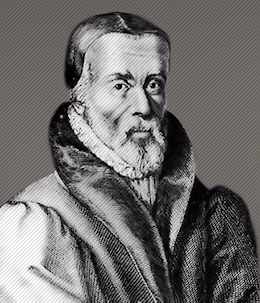Textus Receptus Bibles
William Tyndale Bible 1534
New Testament
| 14:1 | Him that is weake in the fayth receave vnto you not in disputynge and troublynge his conscience. |
| 14:2 | One beleveth that he maye eate all thinge. Another which is weake eateth earbes. |
| 14:3 | Let not him that eateth despise him that eateth not. And let not him whiche eateth not iudge him that eateth. For God hath receaved him. |
| 14:4 | What arte thou that iudgest another manes servaut? Whether he stonde or faule that pertayneth vnto his master: ye he shall stonde. For God is able to make him stonde. |
| 14:5 | This man putteth difference bitwene daye and daye. Another man counteth all dayes alyke. Se that no man waver in his awne meanynge. |
| 14:6 | He that observeth one daye more then another doth it for ye lordes pleasure. And he that observeth not one daye moare then another doeth it to please ye lorde also. He that eateth doth it to please the lorde for he geveth god thankes. |
| 14:7 | And he yt eateth not eateth not to please ye lorde wt all and geveth god thankes. |
| 14:8 | For none of vs lyveth his awne servaut: nether doeth anye of vs dye his awne servaunt. Yf we lyve we lyve to be at ye lordes will. And yf we dye we dye at ye lordes will. Whether we lyve therfore or dye we are the lordes. |
| 14:9 | For Christ therfore dyed and rose agayne and revived that he myght be lorde both of deed and quicke. |
| 14:10 | But why doest thou then iudge thy brother? Other why doest thou despyse thy brother? We shall all be brought before the iudgement seate of Christ. |
| 14:11 | For it is written: as truely as I lyve sayth ye lorde all knees shall bowe to me and all tonges shall geve a knowledge to God. |
| 14:12 | So shall every one of vs geve accomptes of him selfe to God. |
| 14:13 | Let vs not therfore iudge one another eny more. But iudge this rather that no man put a stomblynge blocke or an occasion to faule in his brothers waye. |
| 14:14 | For I knowe and am full certified in the Lorde Iesus that ther is nothinge comen of it selfe: but vnto him that iudgeth it to be comen: to him is it comen. |
| 14:15 | If thy brother be greved with thy meate now walkest thou not charitablye. Destroye not him with thy meate for whom Christ dyed. |
| 14:16 | Cause not youre treasure to be evyll spoken of. |
| 14:17 | For the kyngdome of God is not meate and drinke: but rightewesnes peace and ioye in the holy goost. |
| 14:18 | For whosoever in these thinges serveth Christ pleaseth well God and is commended of men. |
| 14:19 | Let vs folowe tho thinges which make for peace and thinges wherwith one maye edyfie another. |
| 14:20 | Destroye not ye worke of god for a lytell meates sake. All thinges are pure: but it is evyll for that man which eateth with hurte of his conscience. |
| 14:21 | It is good nether to eate flesshe nether to drincke wyne nether eny thinge wherby thy brother stombleth ether falleth or is made weake. |
| 14:22 | Hast thou fayth? have it with thy selfe before god. Happy is he yt condempneth not him selfe in that thinge which he aloweth. |
| 14:23 | For he yt maketh conscience is dampned yf he eate: because he doth it not of fayth. For whatsoever is not of fayth that same is synne. |

William Tyndale Bible 1534
William Tyndale was the first man to ever print the New Testament in the English language. Tyndale also went on to be the first to translate much of the Old Testament from the original Hebrew into English, but he was executed in 1536 for the "crime" of printing the scriptures in English before he could personally complete the printing of an entire Bible. His friends Myles Coverdale, and John [Thomas Matthew] Rogers, managed to evade arrest and publish entire Bibles in the English language for the first time, and within one year of Tyndale's death. These Bibles were primarily the work of William Tyndale.